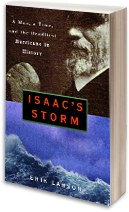This is one of Erik Larson's first books and when he said at his author's talk here in Bend on June 20 (2013) that it was his wife's favorites (she is is initial editor for all his work), I was even more intrigued to read it--having already bought it in preparation for his appearance here. Personally, I did not think it superseded the other two of his which I really liked, Devil in the White City or In the Garden of Beasts (see also my post on Thunderstruck ). He does a good job of describing the hubris of men who were the initial movers and shakers of the national weather bureau and who believed, falsely as it turns out, that they already knew a lot about how hurricanes behaved. They also had political agendas which kept them from paying attention to those who did know how hurricanes behaved, the Cubans, and therefore ignored available warnings that this was a storm to be reckoned with. A lot of people died needlessly as a result. Although Isaac Cline was the chief of the Galveston station at the time the 1900 hurricane wiped out much of the city, and Larson does rely on Cline's memoirs and scientific papers, I think the reader gets a less compelling picture of Isaac than might be expected from the title of the book. As with his other books, Larson has done his research on the meteorology, the history of the weather bureau and relevant events and personalities-- providing extensive documentation which is all relegated to notes at the end of the book; he writes his story with the heart of a novelist so the reader is swept along with the tide of the oncoming storm.

No comments:
Post a Comment